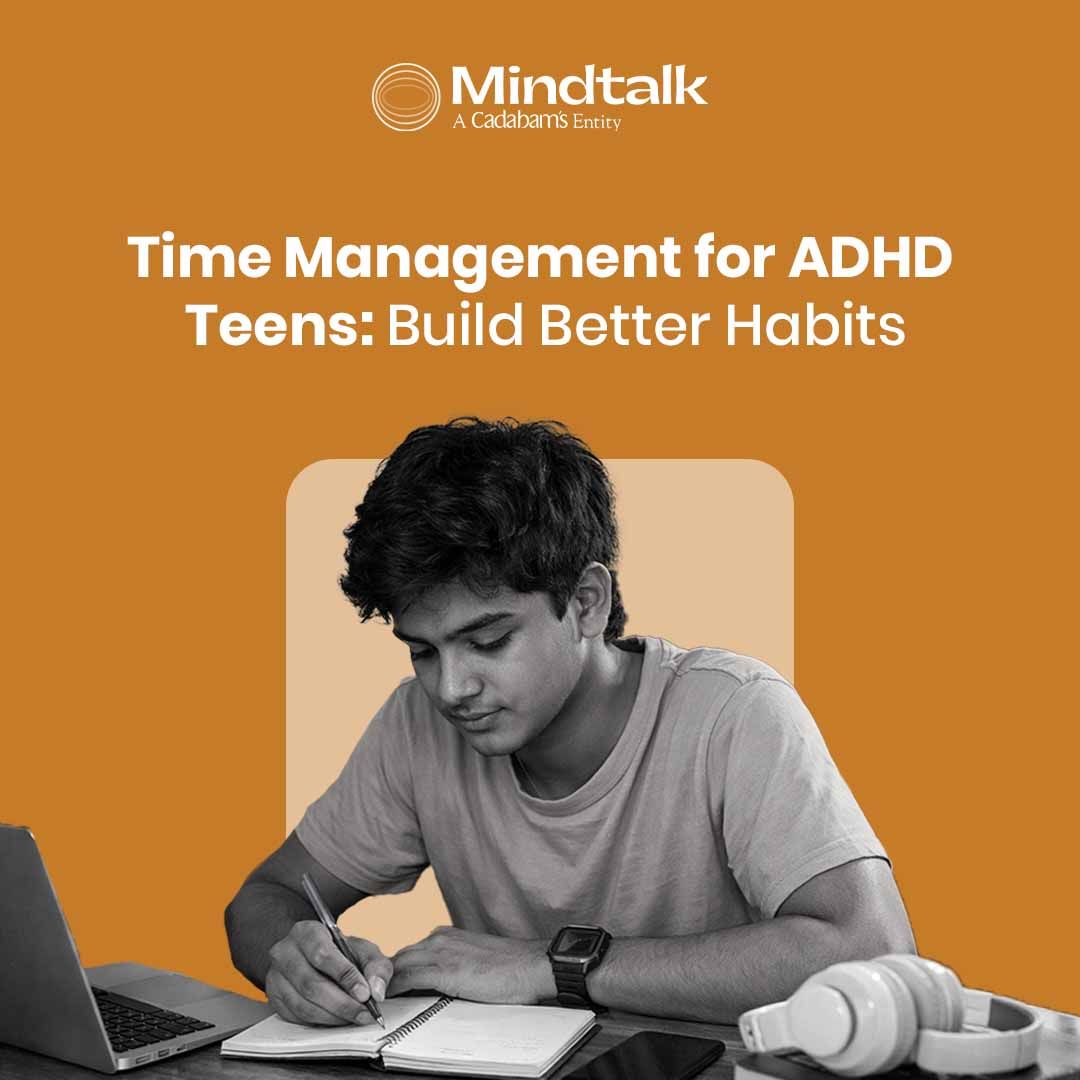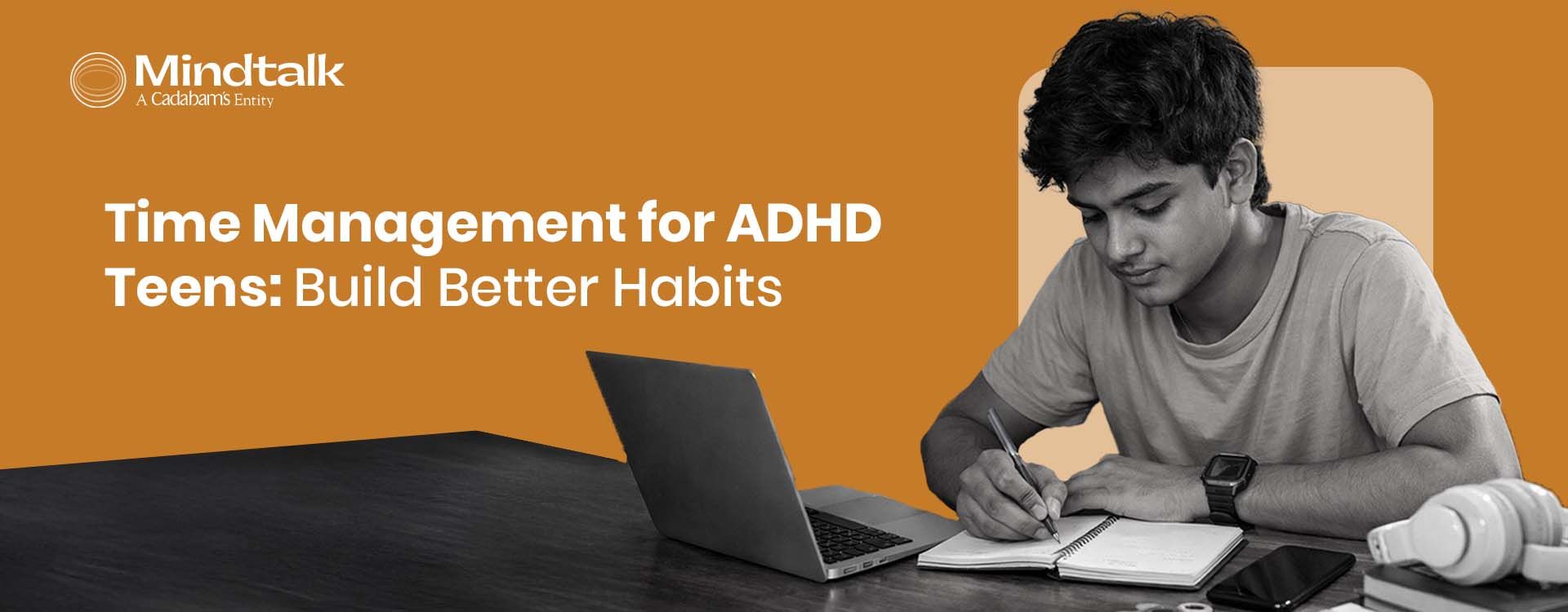Time Management Strategies for ADHD Teens: How to Avoid Procrastination and Stay on Task
For ADHD teens, procrastination, prioritisation, and distraction are often associated with poor self-management. Inadequately tuned self-organisation can lead to uncontrolled impulsive behaviour which results in cramming and missed deadlines. Structured routines, visual planners, micro-goals help improve focus, success, and self-confidence. Better time management decreases stress and helps keep teens on track.

Why ADHD Teens Struggle with Time Management
ADHD affects the ability to plan, organise, and manage time. Teens lose track of deadlines, get distracted, forget due dates, or take longer than expected to complete tasks. Sleep, school, and other commitments make it hard to keep up with schoolwork.
Executive Function & ADHD
ADHD brains struggle with executive functions like planning, impulse control, and organisation. Time blindness, the inability to accurately judge how much time has passed, often leads to procrastination, rushed work, or missed deadlines, needing external structure to manage tasks.
The Science Behind Procrastination in ADHD
A brain with ADHD seeks immediate rewards, so long-term tasks are appealing. Teens will often delay starting work until it's too late and rely on cramming to kickstart focus, creating a stress cycle.
Common Time Management Pitfalls
ADHD teens often face poor organisation, lack of focus and cramming. They misjudge time limits and get distracted by less important tasks. Small tasks become unmanageable piles of work without structure, increasing stress and making goal achievement impossible.
Common Time Management Struggles for ADHD Teens
ADHD teens encounter procrastination, distractions, poor deadline prioritisation, lack of time perception, and poor scheduling skills, resulting in academic chaos and stress.
Procrastination and Task Avoidance
Overwhelming or tedious tasks can trigger avoidance behaviours. A last-minute dash to completion often diverts attention away, only to come back once the diversion stops. Tasks can become more approachable by breaking them down into smaller steps to minimise avoidance.
Losing Track of Deadlines and Appointments
Memory issues, lack of planners, and poor organisation skills in ADHD individuals make it impossible to remember deadlines. Digital planners, calendar alerts, checklists, and accountability partners can help with reminders and tracking of commitments to avoid lost deadlines.
Underestimating or Overestimating How Long Tasks Take
Time mismanagement is common in teens with ADHD. They can focus on a dreaded assignment for hours while overlooking most aspects of a big project, culminating in last-minute scrambles that cause chaos. Tracking time counters can ease stress.
Last-Minute Cramming and Homework Challenges
Poor time awareness results in ADHD teens putting off studying until the last minute. Aside from magnifying stress and fatigue, additional cramming heavily reduces information retention and assimilation. Cramming can be prevented by spaced study sessions, checklists, and structured work habits.
How to Avoid Procrastination with ADHD
The most difficult part of any task is the starting point itself. For ADHD teens, self-motivation through reward breaks can prove productive in overcoming procrastination and improving work habits. Additional aid can also be found from micro-steps.
The 5-Minute Rule:
It can be quite difficult to commence a task. The five-minute rule lights a path toward softer mental barriers—by only asking the brain to engage for five minutes. Once the first steps are taken, momentum increases, making it easier to keep going.
Reward-Based Motivation:
People with ADHD are highly responsive to surges of dopamine. Motivation can be sustained by rewarding effort with small treats like breaks, music, or snacks. Adding point systems to tedious tasks makes the tasks far more enjoyable.
Breaking Tasks into Micro-Steps:
Hefty tasks and to-do list often feel like they must be avoided. Dividing them into smaller steps makes the tasks far more approachable. Instead of "write an essay," think of it as "write one paragraph."
Essential Time Management Strategies for ADHD Teens
Routine, visual aids, prioritisation, and outside accountability enable time management. These techniques aid in ADHD teenagers staying organised, procrastinating less, and completing more tasks in a shorter time frame
Creating a Structured Routine:
Having a set daily routine has been shown to enhance focus while minimising forgetfulness. Designated periods for studying, waking up, and relaxing should be scheduled. It helps ADHD brains perform with greater efficiency and helps reduce fatigue.
The Power of Visual Planners & Timers:
Visual aids like Google Calendar, Pomodoro timers, and even colour-coded lists assist tutors with ADHD in managing their time more effectively. Clearly, seeing tasks aids in avoiding overwhelm, while timers help maintain urgency and focus
Prioritisation Techniques:
To aid ADHD teens in concentrating, the Eisenhower Matrix organises actions by their urgency as well as importance, both, one, or neither. This approach keeps trivial tasks to a minimum and helps meet deadlines and priorities.
Using External Accountability:
Study partners, scheduled check-ins, or even some accountability apps help ADHD teens manage their time. The presence of another person who can monitor progress increases motivation and mitigates the chances of procrastinating or abandoning set tasks.
ADHD-Friendly Study Techniques to Stay on Task
Movement-based studying, the Pomodoro method, and body doubling enable teens with ADHD to stay engaged while improving focus and productivity while studying.
Body Doubling:
When a person encourages another person to work, they enable the latter to stay focused. Even having a study partner, whether in person or virtually, increases students' focus. Having another individual in the room improves accountability, thus enabling engagement with the tasks at hand.
The Pomodoro Technique:
The Pomodoro Technique enhances concentration by dividing work into 25-minute intervals with 5-minute breaks. Those with ADHD reap the benefits of time blocks that stifle burnout and distractions. Short work intervals increase concentration, while the many breaks relieve the study problem.
Movement-Based Studying:
An ADHD brain works best when it is on the move. Multitasking through reading while walking, using a standing desk, or even fidgeting can all improve one’s ability to focus. This also controls the level of dopamine enabling them to study and retain information.
Managing Distractions & Staying Focused
With ADHD, staying focused on one task becomes a challenge. App blockers combined with added control of noise level allow quiet time, minimising distractions and posted goals encourage enhanced task completion with minimal interruption throughout the day.
Digital Detox & App Blockers:
Teens with ADHD cannot escape screens. Focus Mode, Forest, and Freedom are distraction-blocking apps tailored to reduce screen time. Setting limits on apps and notifications and using website blockers can improve attention focus.
Creating a Distraction-Free Environment:
To encourage ADHD-friendly task completion like cleaning, warm light is used. Self-management improves with minimal clutter. Frequent decluttering ensures achievement of set cleanliness goals by only keeping required materials, which actively engages the brain.
Music & White Noise for Focus:
White noise and general instrumental music can help ADHD brains. Gentle instrumental sounds tend to increase concentration without causing overstimulation, while white noise masks distractions.
How Parents Can Support Without Micromanaging
Parents are encouraged to support their children without trying to control every aspect of their lives. Gentle nudging through reminders, flexible study styles, and scaffolding tools enable independence while minimising conflict.
Using Color-Coded Planners and Digital Tools.
ADHD students can benefit greatly from colour assignments in planners. The use of red, yellow, and green helps prioritises and show completion visually. Tools such as Google Keep, Notion, or Trello also help digitally with reminders and organising tasks.
Overcoming Time Blindness in ADHD
For ADHD teens, being able to keep track of time is extremely challenging. They also find no reason to work on tasks until the last moment. Scheduled check-ins and timers can enhance time perception and reduce procrastination.
Visual Schedules and the Power of Routine
Many children with ADHD struggle with abstract concepts such as time. Tools like sand timers and countdown clocks provide a way to visualise the passage of time. Regular morning and evening routines instil a sense of structure and help avoid stress.
Pre-Planning & Buffer Time:
ADHD adolescents frequently misjudge the time required to finish a task. Buffer time, defined as the 5- to 15-minute increase added to complete a task, provides flexibility while decreasing overwhelm. Planning the night before reduces decision fatigue and enhances productivity the following morning.
Practicing Future-Self Thinking:
Rewarding procrastination with attention and imagining the impact ADHD invites tomorrow promotes self-motivation. The question “How will I feel tomorrow if I put this off?” shifts focus to the stress and anxiety of missed deadlines while prioritising free time as an incentive, ultimately improving decision regret.
Tools & Apps That Help ADHD Teens Stay on Task
1.Best Planner Apps: Google Keep, Notion, TickTick.
2.Best Focus Apps: Cold Turkey, Freedom, Forest.
3.Best Reminder Apps: Habitica, Todoist.
ADHD teens can benefit from using gamified to-do lists, accountability apps, visual timers, and the right motivational strategies. Different tools and methods can help reduce distractions and allow teens to complete tasks on time, proving that experimenting with other tools can reveal what works best for individual needs.
Managing School, Extracurriculars, and Social Life Without Overwhelm
It can get overwhelming when school, friends, and other activities are put together. Buffer periods between activities, rest and productivity mixed weekends, and prioritising techniques that avoid overexertion all assist prevent burnout. So does learning to map out social life without sacrificing responsibilities.
What Parents & Teachers Can Do to Help
The motivation and support provided are very important aids in managing ADHD. The movement along with the clear guidelines fosters control in the ADHD teens and keeps the feeling of being heavily monitored at bay. Along with these points, compassion is very important as well.
Encouraging Self-Management
Encouraging self-awareness and responsibility can be done by helping with ADHD teens. Teaching goal setting, time tracking, and reflection fosters independence while planners, habit trackers, and other teaching tools enforce consistency and accountability.
Offering Flexible Structures
ADHD teens dislike rigid instructions. Granting self-directed breaks, encouraging stepping away from traditional learning methods like audiobooks, standing desks, and self-paced work can increase cooperation. Using choices boosts engagement and reduces resistance significantly.
When to Seek Professional Help
If ADHD is severely affecting the individual’s performance at school, their social engagements, or mental health, then support is likely needed. Signs of performance concerns include chronic procrastination, emotional outbursts, or struggling to cope academically. Therapy, ADHD coaching, or medication can help further.
How Positive Mindtalk Improves Time Management in ADHD Teenagers
Adolescents with ADHD experience procrastination due to self-defeating thoughts even positive Mindtalk can help. Self-compassion, forgiving oneself for mistakes, and affirming growth allow agitated teens to move past frustrating moments. “I am learning, not failing” empowers adolescents and helps them successfully manage their time as time management becomes more attainable with increasing confidence.
